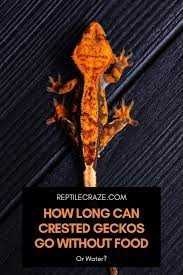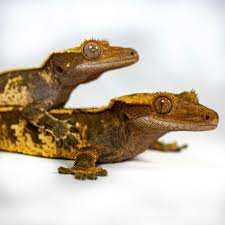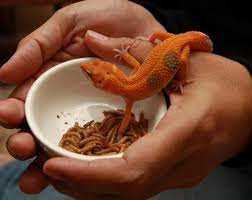But just how long can a crested gecko go without eating? The answer depends on several factors, including the gecko’s age, health, and overall condition. In general, an adult crested gecko can go without food for up to two weeks without any negative effects.
The ability of crested geckos to go without food for extended periods is an adaptation to their natural habitat, where food can be scarce at times. During periods of food scarcity, a gecko’s metabolism slows down, allowing it to conserve energy and survive until food becomes available again.
Factors Affecting a Crested Gecko’s Appetite
1. Stress
2. Temperature
The temperature of their enclosure can affect a crested gecko’s metabolism and appetite. If the temperature is too high or too low, it can lead to a decrease in their appetite. Ensure that the enclosure is properly heated and that the temperature gradient is suitable for your gecko’s needs.
3. Illness or Injury
If your crested gecko is not eating, it could be a sign of an underlying illness or injury. Infections, digestive issues, or mouth problems can all affect their appetite. If you notice a consistent decline in their eating habits, it is essential to consult a veterinarian for a proper diagnosis and treatment.
4. Breeding Season
5. Diet and Food Preferences

Crested geckos have specific dietary requirements, and their appetite can be influenced by the availability and variety of food. Offering a balanced diet that includes a mix of commercial crested gecko food, insects, and fruit can help stimulate their appetite and ensure they are receiving the necessary nutrients.
By considering these factors and making necessary adjustments, you can help maintain a healthy appetite for your crested gecko. Observing their eating habits and consulting a veterinarian when needed will ensure their overall well-being and longevity.
Typical Feeding Schedule for Crested Geckos
When determining the best feeding schedule for your crested gecko, consider the age and size of your gecko. Younger geckos may require more frequent feedings, while adult geckos can be fed less often. It is also important to consider the gecko’s appetite and eating habits.
A typical feeding schedule for a crested gecko may include offering food in the evening, shortly after the gecko becomes active. This allows them to eat while they are most active and alert. It is recommended to provide a small amount of food, such as powdered gecko diet or small insects, and remove any uneaten food within 24 hours to prevent spoilage.
Observing your crested gecko’s behavior and appetite can help determine if the feeding schedule needs to be adjusted. If your gecko consistently refuses food or shows signs of hunger, it may be necessary to increase the frequency or adjust the types of food offered.
Remember to always consult a veterinarian if you have any concerns about your crested gecko’s feeding habits or nutrition. They can provide guidance and ensure your gecko is receiving the proper care and diet for optimal health.
Signs of Hunger in Crested Geckos
Weight Loss

One of the most significant signs that a crested gecko is hungry is weight loss. If you notice that your gecko is losing weight consistently over a period of time, it may indicate that they are not getting enough food. Regularly weigh your gecko and monitor any changes in their weight to determine if they are eating enough.
Inactivity
Another sign of hunger in crested geckos is a decrease in activity level. If your gecko is typically active and suddenly becomes lethargic or spends more time hiding, it may be a sign that they are not eating enough. Watch for any changes in their behavior and consult a veterinarian if you notice prolonged inactivity.
Refusing Food
If your crested gecko consistently refuses to eat, it is a clear indication that they are experiencing hunger. Offer a variety of food options and monitor their response. If they continue to refuse food for an extended period, it is essential to seek veterinary advice to address any underlying health issues.
Loss of Appetite
Loss of appetite is another sign that a crested gecko is not getting enough food. If your gecko shows a lack of interest in their regular food or consistently leaves food uneaten, it may indicate hunger. Pay attention to any changes in their eating habits and adjust their diet accordingly.
Poor Body Condition
Hunger can also lead to poor body condition in crested geckos. If you notice that your gecko’s skin appears loose and wrinkled, or their tail is becoming thinner, it may suggest that they are not receiving adequate nutrition. Regularly assess your gecko’s body condition and make necessary adjustments to their feeding regimen.
By recognizing the signs of hunger in a crested gecko, you can ensure that they receive the proper nutrition and address any feeding-related concerns promptly. Monitoring their weight, activity level, food refusal, appetite, and body condition are essential in maintaining the health and well-being of your crested gecko.
What to Do When Your Crested Gecko Refuses to Eat
If your crested gecko is not eating, there are a few steps you can take to encourage them to start eating again:
1. Check for Signs of Illness:
2. Evaluate the Husbandry:
Poor husbandry can directly impact a gecko’s appetite. Make sure the temperature and humidity levels in their enclosure are within the appropriate range. Incorrect lighting or substrate can also contribute to stress and decrease appetite.
3. Offer a Variety of Food:
Crested geckos have diverse dietary requirements, including a mixture of insects and fruit-based food. Experiment with different types of food to see what your gecko prefers. You can try offering live insects, such as crickets or roaches, or commercial crested gecko diets available in pet stores. Some geckos may also enjoy fruit purees or baby food.
4. Create a Feeding Routine:
Establishing a regular feeding routine can help stimulate your gecko’s appetite. Try feeding them at the same time every day and remove any uneaten food after a few hours. This will prevent food spoilage and also provide a consistent schedule that can eventually lead to increased appetite.
Be patient with your crested gecko and give them time to adjust to any changes in their environment or diet. If they continue to refuse food for an extended period of time, it is crucial to seek veterinary guidance to ensure their health and well-being.
Health Risks of Not Eating for Crested Geckos
One of the most important aspects of crested gecko care is ensuring that they are eating an appropriate diet. These small reptiles have specific nutritional requirements, and a lack of eating can lead to serious health risks.
When a crested gecko goes without eating for an extended period of time, it can quickly begin to lose weight and become malnourished. This can weaken its immune system, making it more susceptible to diseases and infections. Additionally, a lack of proper nutrition can lead to metabolic bone disease, which can cause weak bones and deformities.
In addition to physical health risks, not eating can also have negative effects on a crested gecko’s mental well-being. When a gecko is hungry, it can become stressed and agitated. This can lead to changes in behavior, such as decreased activity levels and an overall decline in quality of life.
Importance of Regular Feeding
Feeding your crested gecko on a consistent schedule can help prevent hunger and maintain a healthy weight. Most crested geckos should be fed every other day, although some individuals may need to be fed more or less frequently depending on their age, size, and individual appetite.
Seeking Veterinary Care
If your crested gecko refuses to eat for an extended period of time, it is essential to seek veterinary care. A veterinarian experienced in reptile medicine can perform a thorough examination and determine the underlying cause of the lack of appetite.
They may recommend diagnostic tests, such as blood work or fecal analysis, to check for any underlying health issues. Additionally, a veterinarian can provide guidance on appropriate feeding techniques, diet adjustments, and any necessary treatments.
How Long Can a Crested Gecko Go Without Eating?
The length of time a Crested Gecko can go without eating varies depending on various factors such as age, overall health, and environmental conditions. However, on average, a healthy adult Crested Gecko can go up to two weeks without eating.
If a Crested Gecko goes for more than two weeks without eating, it is a cause for concern and should be addressed. It is recommended to consult with a veterinarian to determine the underlying cause and ensure proper care.
| Factors Affecting a Crested Gecko’s Appetite |
|---|
| 1. Temperature and humidity levels of the enclosure |
| 2. The presence of hiding spots for stress reduction |
| 3. The quality and variety of food offered |
| 4. Any recent changes in the environment |
The Importance of a Balanced Diet for Crested Geckos
Proper nutrition is essential for the health and well-being of crested geckos. As omnivores, they require a balanced diet that includes both animal and plant-based foods. A diet lacking in essential nutrients can lead to various health issues, including metabolic bone disease and weakened immune system.
1. Animal Protein
Animal protein is important for crested geckos as it provides essential amino acids for growth and development. This can be provided through insects such as crickets, mealworms, and waxworms. It is recommended to gut-load and dust these insects with calcium supplements before feeding them to your gecko.
2. Plant-Based Foods
Plant-based foods are equally important for crested geckos and should make up a significant part of their diet. This can include fruits such as mashed bananas, apricots, and papaya, as well as vegetables like pureed carrots and squash. These foods provide vitamins, minerals, and fiber that are necessary for overall health.
It is vital to provide a variety of plant-based foods to ensure a well-rounded diet for your crested gecko.
3. Calcium and Vitamin D3
Calcium and vitamin D3 are crucial for crested geckos’ bone health and proper calcium metabolism. Without sufficient calcium in their diet, geckos can develop metabolic bone disease, which can lead to deformities and fractures. Dusting their food with calcium and providing vitamin D3 supplements or UVB lighting is essential to prevent this.
4. Avoiding Harmful Foods
There are certain foods that should be avoided when feeding crested geckos. These include citrus fruits, high-fat foods, onions, and garlic. These foods can cause digestive issues and may be toxic to geckos.
Providing a balanced and varied diet is key to ensuring the long-term health and longevity of your crested gecko. Consult with a reptile veterinarian for specific dietary recommendations and guidance tailored to your gecko’s individual needs.
Common Food Options for Crested Geckos

| Food Option | Description |
|---|---|
| Fruit Puree | Many crested gecko owners opt to feed their pets fruit puree, such as baby food, as it is convenient and readily available. Make sure to choose a puree without added sugars or preservatives, and consider mixing it with other food options for variety. |
| Insects | |
| Repashy Crested Gecko Diet | Repashy Crested Gecko Diet is a popular commercially available food option specifically formulated for crested geckos. This powdered food can be mixed with water to create a paste that is easily consumed by geckos. |
| Commercial Gecko Diets | There are several other commercially available gecko diets on the market that are formulated to provide a balanced and complete diet for crested geckos. These diets often come in powdered form and can be mixed with water before feeding. |
| Fruit and Vegetable Mixtures | Some crested gecko owners prefer to create their own fruit and vegetable mixtures to feed their geckos. This can include a combination of fruits like bananas, papayas, and mangos, as well as leafy greens like kale and dandelion greens. |
Best Feeding Practices for Crested Geckos
2. Dust insects with calcium: Before feeding insects to your crested gecko, make sure to dust them with a calcium powder supplement. This helps provide the necessary calcium for healthy bone development and overall growth.
3. Provide fresh water daily: Like all animals, crested geckos need access to fresh water at all times. Make sure to provide them with a shallow dish of clean water that is changed daily to prevent bacteria growth.
4. Feed in the evening: Crested geckos are nocturnal creatures, so it’s best to feed them in the evening when they are most active. This mimics their natural feeding behavior and allows them to consume food when they are most likely to eat.
6. Remove uneaten food: If your gecko does not eat all the food you provide, remove any uneaten portions after a few hours. Leaving uneaten food in their enclosure can attract pests and lead to contamination.
7. Adjust feeding schedule as needed: While a general guideline is to feed crested geckos every other day, some may require more or less frequent feedings. Monitor their weight and overall health to determine the ideal feeding schedule for your individual gecko.
8. Consult a veterinarian: If you have any concerns about your crested gecko’s feeding habits or overall health, it’s always best to consult a veterinarian who specializes in reptiles. They can provide personalized advice and guidance based on your gecko’s specific needs.
By following these best feeding practices, you can ensure that your crested gecko remains healthy and receives the nutrition it needs to thrive.
Consulting a Veterinarian for Feeding-related Concerns
If your crested gecko is not eating or showing signs of hunger, a veterinarian can help determine the underlying cause. They may perform a thorough examination and possibly run diagnostic tests to rule out any health issues that could be affecting your gecko’s appetite.
In addition to diagnosing any medical conditions, a veterinarian can also provide specific recommendations for feeding your crested gecko. They can assess your gecko’s current diet and suggest any necessary modifications or supplements to ensure a balanced and nutritious meal plan.
A veterinarian can also offer advice on feeding techniques and methods to encourage your crested gecko to eat. They may recommend different food options or provide tips on how to make meals more appealing to your gecko.

I’m Lena Adams—a product of an unconventional upbringing in the African wilderness. My father, a daring explorer of African wildlife, sparked my fascination with reptiles, a passion that intertwined with the tragic loss of my mother during an expedition, leaving an indelible mark on my life. Driven to understand the creatures that captivated my parents, I embarked on my journey, sharing insights about reptiles, frogs, and lizards on my website. Through my explorations and conservation efforts, I honour my family’s legacy while seeking connections—to the creatures, nature, and the mother whose presence I yearn to understand.
